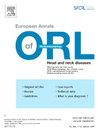Deciding whether to do elective neck dissection in patients with salivary gland tumors with no evidence of neck lymph node metastasis
IF 1.9
4区 医学
Q2 OTORHINOLARYNGOLOGY
European Annals of Otorhinolaryngology-Head and Neck Diseases
Pub Date : 2025-05-01
DOI:10.1016/j.anorl.2025.02.001
引用次数: 0
Abstract
Aim
The treatment of salivary gland cancers with clinically negative neck is controversial, with divergent guidelines about elective neck dissection (END). Even though these guidelines are widely used, they mostly rely on retrospective research that are subject to methodological flaws and selection bias.
Methods
A critical narrative review. Problem description, identification of likely clinical scenarios, appraisal of previous recommendations, critical examination of available data, and presentation of clinical decision-making options comprised the article creation.
Results
One of the most important factors is the rate of occult lymph node metastases, which ranges from 2-30% and varies greatly depending on the kind and grade of tumor. The use of risk classification according to preoperative findings, such as tumor size, grade, and clinical signs such involvement of the facial nerve, offers some guidance. Nevertheless, unanticipated cancers are frequently discovered by intraoperative and postoperative histological results, which makes decision-making even more difficult. Alternatives to END, including elective neck irradiation, have similar effectiveness in reducing regional recurrence in high-risk scenarios. Although END may enhance regional control, it carries risks of surgical complications, such as injury to nerves and functional impairment. No prospective randomized studies have definitively demonstrated the advantage of END regarding survival or recurrence.
Conclusion
END may be appropriate in certain high-risk situations, but its regular use in cN0 salivary gland cancers is still up for debate. A personalized strategy that accounts for tumor-specific and patient-related variables, together with careful use of adjuvant treatments, is advised until substantial prospective data is available.
无颈部淋巴结转移证据的涎腺肿瘤患者择期是否行颈部清扫。
目的:涎腺癌临床阴性颈部的治疗是有争议的,关于选择性颈部清扫(END)的指南存在分歧。尽管这些指导方针被广泛使用,但它们大多依赖于回顾性研究,容易受到方法缺陷和选择偏差的影响。方法:批判性叙事回顾。问题描述,确定可能的临床情况,评估以前的建议,对现有数据的批判性检查,以及临床决策选择的呈现,包括文章的创建。结果:隐匿性淋巴结转移率是影响肿瘤转移的重要因素之一,隐匿性淋巴结转移率在2-30%之间,随肿瘤种类和分级的不同而有很大差异。根据术前发现,如肿瘤大小、分级和临床症状(如累及面神经),使用风险分类提供了一些指导。然而,术中和术后的组织学结果经常发现意想不到的癌症,这使得决策更加困难。替代END的方法,包括选择性颈部放疗,在减少高风险病例的局部复发方面具有相似的效果。尽管END可以增强局部控制,但它有手术并发症的风险,如神经损伤和功能障碍。没有前瞻性随机研究明确证明END在生存或复发方面的优势。结论:END可能适用于某些高危情况,但其在cN0唾液腺癌中的常规应用仍存在争议。在获得大量前瞻性数据之前,建议采用考虑肿瘤特异性和患者相关变量的个性化策略,并谨慎使用辅助治疗。
本文章由计算机程序翻译,如有差异,请以英文原文为准。
求助全文
约1分钟内获得全文
求助全文
来源期刊

European Annals of Otorhinolaryngology-Head and Neck Diseases
OTORHINOLARYNGOLOGY-
CiteScore
3.70
自引率
28.00%
发文量
97
审稿时长
12 days
期刊介绍:
European Annals of Oto-rhino-laryngology, Head and Neck diseases heir of one of the oldest otorhinolaryngology journals in Europe is the official organ of the French Society of Otorhinolaryngology (SFORL) and the the International Francophone Society of Otorhinolaryngology (SIFORL). Today six annual issues provide original peer reviewed clinical and research articles, epidemiological studies, new methodological clinical approaches and review articles giving most up-to-date insights in all areas of otology, laryngology rhinology, head and neck surgery. The European Annals also publish the SFORL guidelines and recommendations.The journal is a unique two-armed publication: the European Annals (ANORL) is an English language well referenced online journal (e-only) whereas the Annales Françaises d’ORL (AFORL), mail-order paper and online edition in French language are aimed at the French-speaking community. French language teams must submit their articles in French to the AFORL site.
Federating journal in its field, the European Annals has an Editorial board of experts with international reputation that allow to make an important contribution to communication on new research data and clinical practice by publishing high-quality articles.
 求助内容:
求助内容: 应助结果提醒方式:
应助结果提醒方式:


